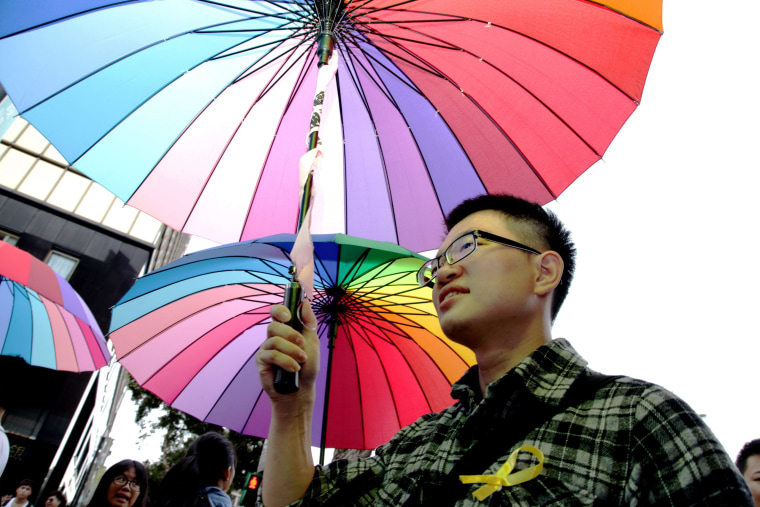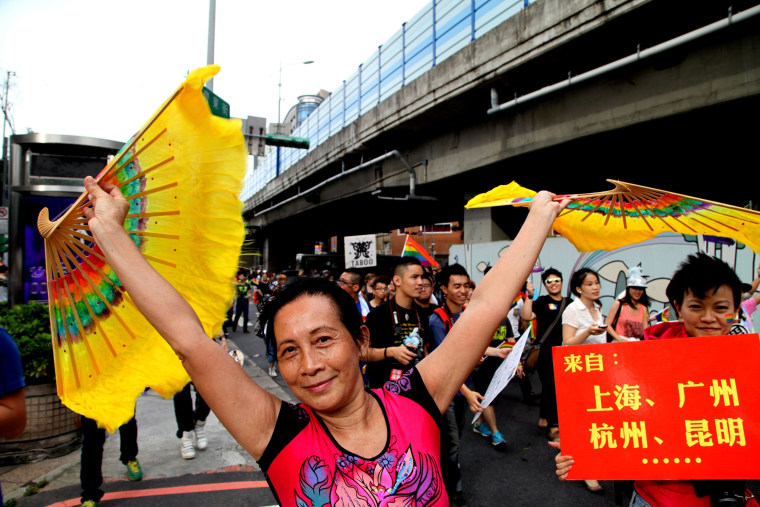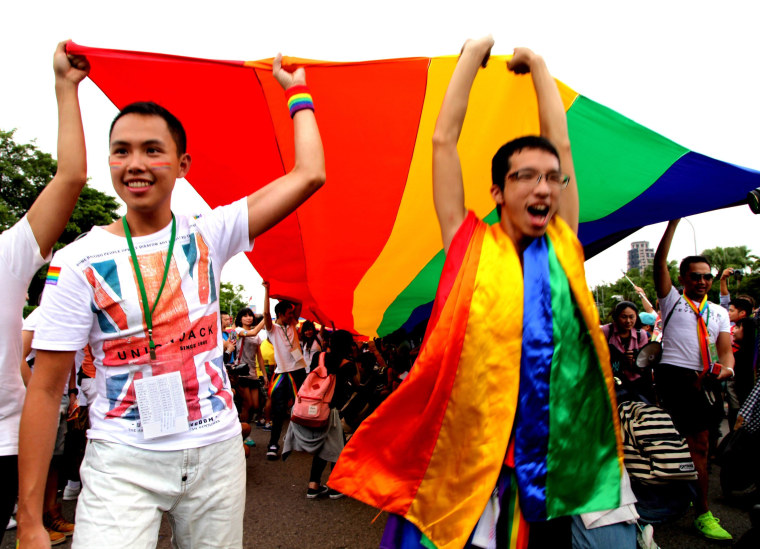Taiwan may lead Asia when it comes to gay rights, but legislators have left a proposed same-sex marriage law languishing in political purgatory, leaving the community in legal limbo. Still, members of Taiwan's LGBT community flooded the streets of Taipei this weekend, at the 12th annual gay pride parade, attracting more than 65,000 supporters who kicked off celebrations in front of the presidential palace along Ketagalan Boulevard. The parade, believed to be the largest pride gathering in Asia, attracted travelers from Hong Kong, China, Singapore and Malaysia.
“I want to be acknowledged,” said Joseph Yao, 27, who participated in the parade. Yao says that even though Taiwan is a democratic and progressive country, it’s still driven by conservative Chinese values. “A country that doesn’t recognize their gay population, doesn’t accept them," said Yao. "It all starts with acceptance.”
Same sex unions are not currently allowed in Taiwan or anywhere in Asia. However, Taiwan has openly gay celebrities, a top rated male-to-female transgender talk show host, and even a popular lesbian band. In pop culture, there’s no lack of representation, but legal marriage in Taiwan remains strictly between a man and a woman.
Ketagalan Boulevard is a 400-meter road with 10 lanes that lead directly to the front doors of the presidential palace. There are no traffic islands in the way and no cars parked on the side of the road. The asphalt is smooth and traffic lines are pristine.
Well-groomed palm trees stand regal and tall, lining the curbs. Every few feet, a Taiwanese flag is displayed on a stand, rotated at 90 degrees and hanging on its side to be fully visible at all times. On most days, the street is quiet and sparsely-populated.
“No one has the right to tell me who I can marry.”
But this weekend, Lady Gaga’s “Born This Way” blasted from loud speakers, the unofficial parade anthem. Rainbow paraphernalia flooded the streets. Members of the lobby alliance for LGBT human rights marched in formal wear –- wedding gowns and bowties -– to protest against marriage inequality.
The group sold “gay water” in mockery of those that think homosexuality is contagious. Even yellow umbrellas made an appearance, as participants from Hong Kong brought a piece of the Umbrella Revolution with them.

Kory Chen, a pansexual college sophomore, attended the parade with her school’s gender equality group. She carried a sign that said “Marry Who You Love”.
“Marriage is between two people,” said Chen. “No one has the right to tell me who I can marry.” For Chen, the gay pride parade represents a movement toward marriage equality and the kind of national acceptance she was fortunate to find at home. She says she’s very open with her family about her sexual orientation – her father, in fact, was her chauffeur for the day.
“Regardless if I want to get married or not, I think [the law] should pass. It’s a human right.”
Gay couples may not be legally recognized in Taiwan but the country has been inching towards an official policy of equality for years. Work place and school discrimination based on sexual orientation are banned nationwide. Openly gay soldiers are allowed to participate in the country's mandatory conscription system. Citizens can legally engage in consensual gay sex and change their gender.
In 2003, the government took a legal leap forward, and proposed legislation to pass same sex marriages under the "Human Rights Basic Law." The law was rejected in 2006.

Last month, the legislator who proposed the bill, Democratic Progressive Party legislator Yu Mei-nu, was selected as the sessional judicial committee leader. The role gave Yu more influence to push the bill into a second reading. However, Yu’s committee position expires shortly after the New Year, giving the legislature a short window within which they could potentially make history.
Taipei resident Clarence Xie is watching his government's actions closely. Xie hasn’t come out to his family because he doesn't think it’s the right time. Although he’s brought partners home, they’re introduced as platonic friends. “When they pressure me to get married and have a baby, then I’ll tell them,” Xie explained.
The same sex marriage bill is now up for a second reading and consideration by the legislature. If it moves to a third reading, and passes, Taiwan would make history as the first country in Asia to permit same sex marriages.
“Regardless if I want to get married or not, I think it should pass,” said Xie. “It’s a human right.”
